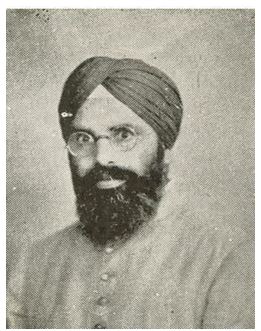MANGAL SINGH GILL

Sirdar Mangal Singh Gill (6.6.1892 – 16.6.1987), son of Zaildar Kapur Singh, was born at village Gill (district Ludhiana). Later, his parents had moved to Chakk No. 208 (district Lyallpur, now Faisalabad, Pakistan). He passed his degree in education and joined teaching job for a short period. In 1914, he joined the British Indian Army and participated in the First World War. He was awarded honorary degree of bachelor or arts and was appointed as Tehsildar. During the war, he had developed dislike for the British and he was not interested in his job. By this time, Gurdwara Reform Movement had begun. He joined this movement. On May 21, 1920, the Sikh elite started a newspaper named Akali. Mangal Singh was selected the editor of the newspaper. In 1921, he was arrested on the charges of sedition. He was sentenced to five years imprisonment. He was released in August 1923. He was elected member of the S.G.P.C. when he was still in jail. In October 1923, Akali Dal and the S.G.P.C. were declared as unlawful organisations. He too was arrested but was released for want of evidence against him. On September 8, 1924, the Akali Dal launched Hindustan Times, a daily English newspaper. Mangal Singh was appointed the incharge of this paper (in 1926, this paper was sold to Birla, an industrialist). In November 1925, he was elected the President of the S.G.P.C. When Sardar Bahadur Mahtab Singh and Giani Sher Singh group agreed to be released from jail under minor conditions, Mangal Singh was the President of the S.G.P.C. The elections to the S.G.P.C., under the Gurdwara Act, were held on June 18, 1926. Mangal Singh was elected its first President on September 4, On October 2, 1926, he resigned the president-ship to pave way for the election of Master Tara Singh as the President of the S.G.P.C. Mangal Singh was one of the senior leaders and he participated in several agitations. During that period, he was a member of all the major committees of the Sikhs. In 1927, he was appointed as a member of the Committee, which was formed to decide the issue of communal representation in legislative elections to Indian Parliament and Assemblies. This Committee presented the in-famous Nehru Report (1927). The Sikhs rejected it. Mangal Singh, who was a member of the Committee, made it an issue of prestige and he fully supported the Report. This led to division in the rank and file of Akali Dal. When Mangal Singh became too much vocal in support of the Report, he became isolated. In 1930, he was arrested in connection with the Civil Disobedience Movement of Gandhi. He was chosen as Member of Parliament (Central Legislative Assembly) in 1935. He continued to be a member till 1945. In spite of the fact that he was a pro-Congress worker even at the cost of the Sikh interests, he was issued “orders” by the Whip of the Congress Legislature party “not to ask questions in the Council (parliament), on the issues regarding the interests of the Sikhs”. The Akali Dal asked him to return to Akali Dal but he did not. After 1945, the Congress party did not bother for him, so he joined the Akali Dal. This time he was re-elected to the Parliament as an Akali candidate. Mangal Singh remained active in politics until 1960. He spent last years of his life in isolation, at Chandigarh, at the residence of his daughter. In 1981, while talking to Dr Harjinder Singh Dilgeer, the Sikh hisotrian, he confessed that he had committed treason with the Sikh Panth by supporting the Nehru Report in 1928 and by siding with the Congress Party.
(Dr Harjinder Singh Dilgeer)